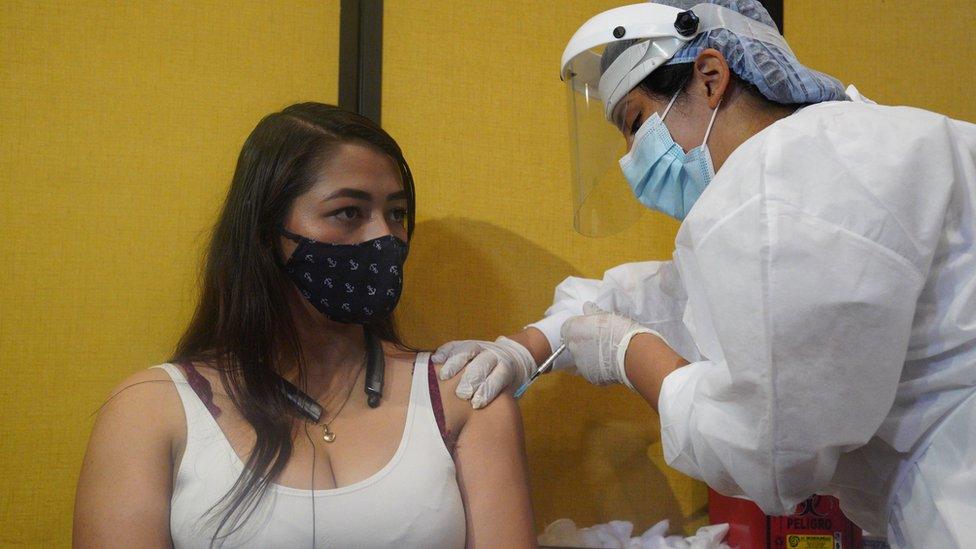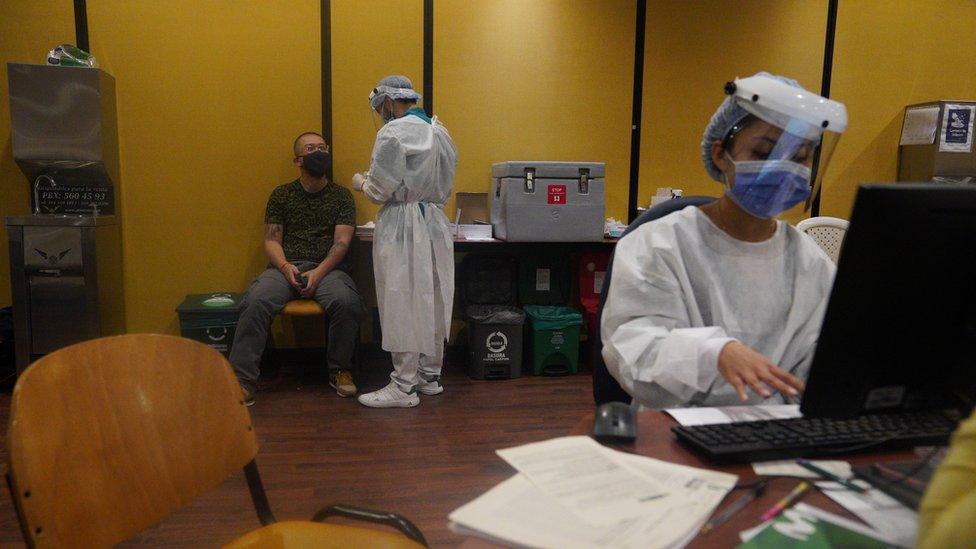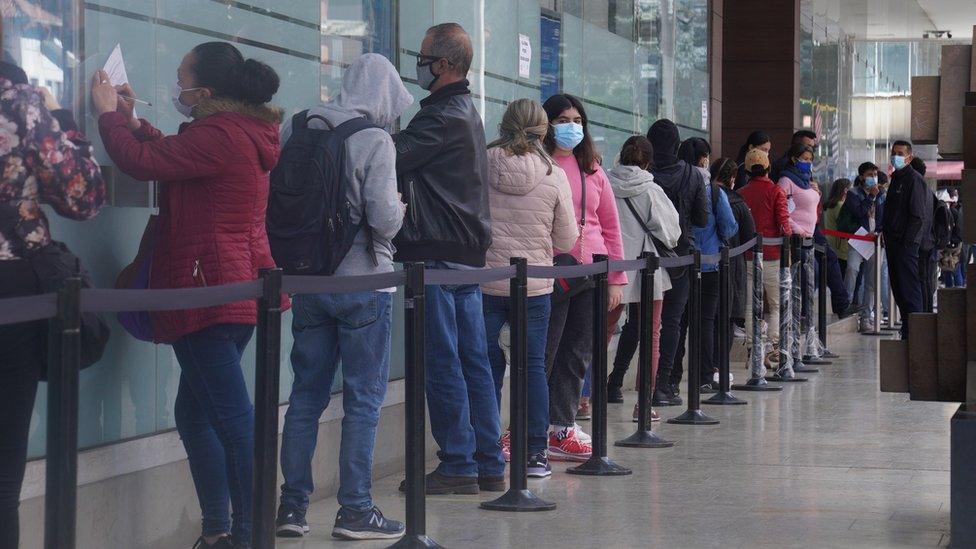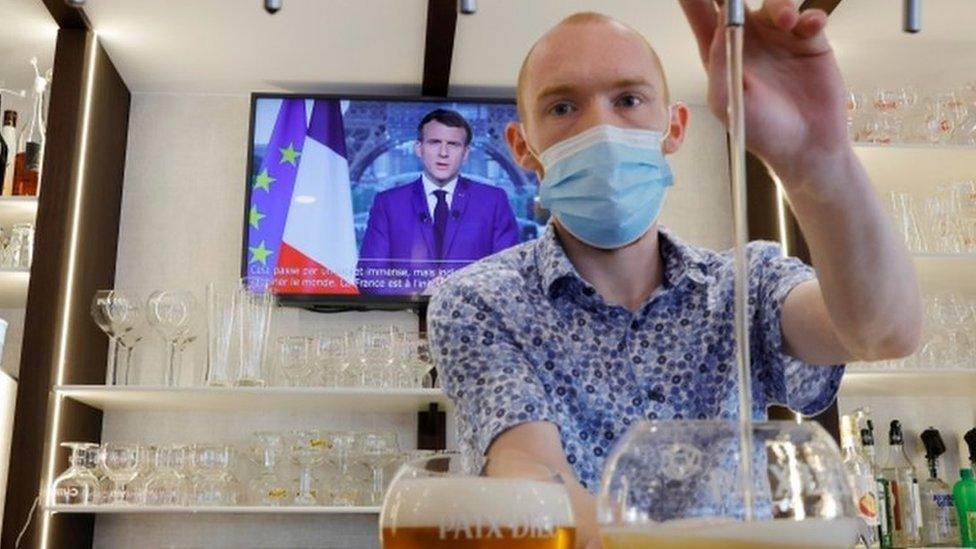Colombia bets on privately funded Covid vaccinations
- Published

Johana Bautista got access to a Covid vaccine through the company where she works
When her company announced it had purchased coronavirus vaccines, Johanna Bautista made sure to register with the human resources department for a free shot.
The 26-year-old works as a door-to-door sales agent for telecommunications company Movistar.
A few days later she was at a convention centre in Colombia's capital, Bogotá, getting her first dose of the Sinovac vaccine.
"It could take months before the government starts to vaccinate people my age," Ms Bautista said.
"Getting this vaccine today makes me feel very happy and relieved."
Slow vaccine rollout
Like many developing countries, Colombia is struggling to get enough vaccines for its citizens, even as the number of coronavirus cases in the country rises due to new variants and fewer restrictions on the economy.
 Global vaccine rollout
Global vaccine rollout
Percent of people fully vaccinated
| World |
61
|
12,120,524,547 |
| China |
87
|
3,403,643,000 |
| India |
66
|
1,978,918,170 |
| US |
67
|
596,233,489 |
| Brazil |
79
|
456,903,089 |
| Indonesia |
61
|
417,522,347 |
| Japan |
81
|
285,756,540 |
| Bangladesh |
72
|
278,785,812 |
| Pakistan |
57
|
273,365,003 |
| Vietnam |
83
|
233,534,502 |
| Mexico |
61
|
209,179,257 |
| Germany |
76
|
182,926,984 |
| Russia |
51
|
168,992,435 |
| Philippines |
64
|
153,852,751 |
| Iran |
68
|
149,957,751 |
| UK |
73
|
149,397,250 |
| Turkey |
62
|
147,839,557 |
| France |
78
|
146,197,822 |
| Thailand |
76
|
139,099,244 |
| Italy |
79
|
138,319,018 |
| South Korea |
87
|
126,015,059 |
| Argentina |
82
|
106,075,760 |
| Spain |
87
|
95,153,556 |
| Egypt |
36
|
91,447,330 |
| Canada |
83
|
86,256,122 |
| Colombia |
71
|
85,767,160 |
| Peru |
83
|
77,892,776 |
| Malaysia |
83
|
71,272,417 |
| Saudi Arabia |
71
|
66,700,629 |
| Myanmar |
49
|
62,259,560 |
| Chile |
92
|
59,605,701 |
| Taiwan |
82
|
58,215,158 |
| Australia |
84
|
57,927,802 |
| Uzbekistan |
46
|
55,782,994 |
| Morocco |
63
|
54,846,507 |
| Poland |
60
|
54,605,119 |
| Nigeria |
10
|
50,619,238 |
| Ethiopia |
32
|
49,687,694 |
| Nepal |
69
|
46,888,075 |
| Cambodia |
85
|
40,956,960 |
| Sri Lanka |
68
|
39,586,599 |
| Cuba |
88
|
38,725,766 |
| Venezuela |
50
|
37,860,994 |
| South Africa |
32
|
36,861,626 |
| Ecuador |
78
|
35,827,364 |
| Netherlands |
70
|
33,326,378 |
| Ukraine |
35
|
31,668,577 |
| Mozambique |
44
|
31,616,078 |
| Belgium |
79
|
25,672,563 |
| United Arab Emirates |
98
|
24,922,054 |
| Portugal |
87
|
24,616,852 |
| Rwanda |
65
|
22,715,578 |
| Sweden |
75
|
22,674,504 |
| Uganda |
24
|
21,756,456 |
| Greece |
74
|
21,111,318 |
| Kazakhstan |
49
|
20,918,681 |
| Angola |
21
|
20,397,115 |
| Ghana |
23
|
18,643,437 |
| Iraq |
18
|
18,636,865 |
| Kenya |
17
|
18,535,975 |
| Austria |
73
|
18,418,001 |
| Israel |
66
|
18,190,799 |
| Guatemala |
35
|
17,957,760 |
| Hong Kong |
86
|
17,731,631 |
| Czech Republic |
64
|
17,676,269 |
| Romania |
42
|
16,827,486 |
| Hungary |
64
|
16,530,488 |
| Dominican Republic |
55
|
15,784,815 |
| Switzerland |
69
|
15,759,752 |
| Algeria |
15
|
15,205,854 |
| Honduras |
53
|
14,444,316 |
| Singapore |
92
|
14,225,122 |
| Bolivia |
51
|
13,892,966 |
| Tajikistan |
52
|
13,782,905 |
| Azerbaijan |
47
|
13,772,531 |
| Denmark |
82
|
13,227,724 |
| Belarus |
67
|
13,206,203 |
| Tunisia |
53
|
13,192,714 |
| Ivory Coast |
20
|
12,753,769 |
| Finland |
78
|
12,168,388 |
| Zimbabwe |
31
|
12,006,503 |
| Nicaragua |
82
|
11,441,278 |
| Norway |
74
|
11,413,904 |
| New Zealand |
80
|
11,165,408 |
| Costa Rica |
81
|
11,017,624 |
| Ireland |
81
|
10,984,032 |
| El Salvador |
66
|
10,958,940 |
| Laos |
69
|
10,894,482 |
| Jordan |
44
|
10,007,983 |
| Paraguay |
48
|
8,952,310 |
| Tanzania |
7
|
8,837,371 |
| Uruguay |
83
|
8,682,129 |
| Serbia |
48
|
8,534,688 |
| Panama |
71
|
8,366,229 |
| Sudan |
10
|
8,179,010 |
| Kuwait |
77
|
8,120,613 |
| Zambia |
24
|
7,199,179 |
| Turkmenistan |
48
|
7,140,000 |
| Slovakia |
51
|
7,076,057 |
| Oman |
58
|
7,068,002 |
| Qatar |
90
|
6,981,756 |
| Afghanistan |
13
|
6,445,359 |
| Guinea |
20
|
6,329,141 |
| Lebanon |
35
|
5,673,326 |
| Mongolia |
65
|
5,492,919 |
| Croatia |
55
|
5,258,768 |
| Lithuania |
70
|
4,489,177 |
| Bulgaria |
30
|
4,413,874 |
| Syria |
10
|
4,232,490 |
| Palestinian Territories |
34
|
3,734,270 |
| Benin |
22
|
3,681,560 |
| Libya |
17
|
3,579,762 |
| Niger |
10
|
3,530,154 |
| DR Congo |
2
|
3,514,480 |
| Sierra Leone |
23
|
3,493,386 |
| Bahrain |
70
|
3,455,214 |
| Togo |
18
|
3,290,821 |
| Kyrgyzstan |
20
|
3,154,348 |
| Somalia |
10
|
3,143,630 |
| Slovenia |
59
|
2,996,484 |
| Burkina Faso |
7
|
2,947,625 |
| Albania |
43
|
2,906,126 |
| Georgia |
32
|
2,902,085 |
| Latvia |
70
|
2,893,861 |
| Mauritania |
28
|
2,872,677 |
| Botswana |
63
|
2,730,607 |
| Liberia |
41
|
2,716,330 |
| Mauritius |
74
|
2,559,789 |
| Senegal |
6
|
2,523,856 |
| Mali |
6
|
2,406,986 |
| Madagascar |
4
|
2,369,775 |
| Chad |
12
|
2,356,138 |
| Malawi |
8
|
2,166,402 |
| Moldova |
26
|
2,165,600 |
| Armenia |
33
|
2,150,112 |
| Estonia |
64
|
1,993,944 |
| Bosnia and Herzegovina |
26
|
1,924,950 |
| Bhutan |
86
|
1,910,077 |
| North Macedonia |
40
|
1,850,145 |
| Cameroon |
4
|
1,838,907 |
| Kosovo |
46
|
1,830,809 |
| Cyprus |
72
|
1,788,761 |
| Timor-Leste |
52
|
1,638,158 |
| Fiji |
70
|
1,609,748 |
| Trinidad and Tobago |
51
|
1,574,574 |
| Jamaica |
24
|
1,459,394 |
| Macau |
89
|
1,441,062 |
| Malta |
91
|
1,317,628 |
| Luxembourg |
73
|
1,304,777 |
| South Sudan |
10
|
1,226,772 |
| Central African Republic |
22
|
1,217,399 |
| Brunei |
97
|
1,173,118 |
| Guyana |
58
|
1,011,150 |
| Maldives |
71
|
945,036 |
| Lesotho |
34
|
933,825 |
| Yemen |
1
|
864,544 |
| Congo |
12
|
831,318 |
| Namibia |
16
|
825,518 |
| Gambia |
14
|
812,811 |
| Iceland |
79
|
805,469 |
| Cape Verde |
55
|
773,810 |
| Montenegro |
45
|
675,285 |
| Comoros |
34
|
642,320 |
| Papua New Guinea |
3
|
615,156 |
| Guinea-Bissau |
17
|
572,954 |
| Gabon |
11
|
567,575 |
| Eswatini |
29
|
535,393 |
| Suriname |
40
|
505,699 |
| Samoa |
99
|
494,684 |
| Belize |
53
|
489,508 |
| Equatorial Guinea |
14
|
484,554 |
| Solomon Islands |
25
|
463,637 |
| Haiti |
1
|
342,724 |
| Bahamas |
40
|
340,866 |
| Barbados |
53
|
316,212 |
| Vanuatu |
40
|
309,433 |
| Tonga |
91
|
242,634 |
| Jersey |
80
|
236,026 |
| Djibouti |
16
|
222,387 |
| Seychelles |
82
|
221,597 |
| Sao Tome and Principe |
44
|
218,850 |
| Isle of Man |
79
|
189,994 |
| Guernsey |
81
|
157,161 |
| Andorra |
69
|
153,383 |
| Kiribati |
50
|
147,497 |
| Cayman Islands |
90
|
145,906 |
| Bermuda |
77
|
131,612 |
| Antigua and Barbuda |
63
|
126,122 |
| Saint Lucia |
29
|
121,513 |
| Gibraltar |
123
|
119,855 |
| Faroe Islands |
83
|
103,894 |
| Grenada |
34
|
89,147 |
| Greenland |
68
|
79,745 |
| St Vincent and the Grenadines |
28
|
71,501 |
| Liechtenstein |
69
|
70,780 |
| Turks and Caicos Islands |
76
|
69,803 |
| San Marino |
69
|
69,338 |
| Dominica |
42
|
66,992 |
| Monaco |
65
|
65,140 |
| Saint Kitts and Nevis |
49
|
60,467 |
| British Virgin Islands |
59
|
41,198 |
| Cook Islands |
84
|
39,780 |
| Anguilla |
67
|
23,926 |
| Nauru |
79
|
22,976 |
| Burundi |
0.12
|
17,139 |
| Tuvalu |
52
|
12,528 |
| Saint Helena |
58
|
7,892 |
| Montserrat |
38
|
4,422 |
| Falkland Islands |
50
|
4,407 |
| Niue |
88
|
4,161 |
| Tokelau |
71
|
1,936 |
| Pitcairn |
100
|
94 |
| British Indian Ocean Territory |
0
|
0 |
| Eritrea |
0
|
0 |
| North Korea |
0
|
0 |
| South Georgia and the South Sandwich Islands |
0
|
0 |
| Vatican |
0
|
0 |
Please upgrade your browser to see the full interactive
This information is regularly updated but may not reflect the latest totals or vaccines administered for each location. Total doses may include booster doses in addition to those required for full vaccination. The definition of full vaccination varies by location and vaccine type and is subject to change over time. Full vaccination can refer to a person receiving all required doses of a specific vaccine or sometimes recovery from infection plus one dose of a vaccine. Definitions have not yet been updated to account for booster campaigns to control the spread of new variants. Some locations may reach vaccination rates over 100%, such as Gibraltar, due to population estimates that are lower than the number of people who have now been vaccinated in that place.
Source: Our World in Data
Last updated: 5 July 2022, 13:28 BST

The government's vaccination programme has so far delivered about 22 million doses in the country of 50 million inhabitants, but only about 18% of the population has been fully vaccinated.
To speed things up Colombia is now allowing companies to import vaccines and distribute them for free among their staff.
With the government's help, employers have purchased 2.5 million doses so far, in an effort to protect workers and boost productivity during the pandemic.
And business associations say they are getting calls from companies in other Latin American countries that are interested in putting similar schemes in place.
Ethical questions
But the private vaccination scheme - which runs in parallel to the government's own vaccination efforts - has also also been criticised by public health experts who question its ethics and scientific grounding.
While hundreds of thousands of workers with full-time jobs will be vaccinated under the privately funded scheme, others who are unemployed, or work in the informal economy, are being left out.
Even if they need the vaccines just as urgently.

Manuel David Cañas, who entertains motorists for tips, is one of those not covered by the scheme
"While this is a valuable way to speed up vaccination, it does not help us to decrease inequality" says Claudia Vaca, an epidemiologist at the National University in Bogotá.
"It's like creating a VIP queue for those who have the resources to purchase vaccines" says Prof Vaca, who is also a spokeswoman for the Alliance for Health and Life, a group of public health experts that has been critical of the Colombian government's approach to the pandemic.
'Act of solidarity'
Private-sector vaccine purchases were first approved by Colombia in April, as nearby countries like Peru and Argentina approved similar legislation.
But efforts by Colombian companies to import vaccines were initially unsuccessful, because manufacturers were tied up with large orders from national governments.
To help companies acquire vaccines, the Colombian government and the private sector formed a partnership through which the government ceded 2.5 million vaccines it had secured from Chinese pharmaceutical Sinovac to a consortium of companies that paid for the shots and agreed to cover transport and distribution.
ANDI, a business association that represents more than 1,200 companies in Colombia, compiled a database of companies that wanted vaccines and set up a fund into which they could pay.

Another Movistar employee was among those getting vaccinated in Bogotá
According to the association, more than 5,000 companies participated in the scheme, which was also open to businesses which are not ANDI members, paying approximately $60 (£43) per vaccine after transport and distribution were included.
Through the scheme, companies will help Colombia's government to pay for the vaccination of at least 1.25 million people.
"This is a project in which companies are participating without profits in mind," President Iván Duque said on 28 June.
"It is the greatest act of corporate solidarity that we have seen in our country."
Meanwhile the public vaccination campaign rumbles on, with about 9 million people fully vaccinated according to the Ministry of Health.
But vaccines are still arriving at a modest pace, even as the number of people dying from Covid-19 in Colombia is twice as high as in April, forcing the government to prioritize those who are most likely to get ill.
Currently vaccination is only available to people over 40 - and some younger people with serious illnesses - under the government's plan.
Age no hurdle
But under the privately funded vaccination campaign companies are free to choose how they distribute jabs to employees, as long as all staff members are eventually covered. And anyone over 18 is eligible.

The vaccination roll-out in Colombia has been slow
Some of the country's largest companies have chosen to start with employees under 40 while others, like Movistar, said they would start by vaccinating employees who have the most face-to-face interaction with customers, regardless of their age.
Rappi, a popular delivery app, generated outrage when it announced it would prioritise workers who had accumulated the highest number of deliveries on its platform.
Some doctors have said the privately funded vaccination campaign is throwing epidemiological criteria out the window.
"When vaccines are rare you want to start with the most vulnerable population groups" said Dr Herman Bayona, the president of Bogotá's Medical College.
"This privately funded scheme is designed to solve the problems of companies but it is not necessarily designed with society's needs in mind."
Company representatives argue that the privately funded vaccination plan will eventually help the government to focus on vulnerable groups like homeless people or street vendors.
"The informal sector still faces big challenges," says Ricardo García Molina, the general manager of Evertec, a payments company that bought vaccines for all of its employees in Colombia.
"As companies like ours take pressure off the health system by vaccinating our workers, we give the government more space to take care of people who are being left behind," Mr García Molina argues.
'Everyone is trying to save themselves'
Evertec's general manager said that four employees tested positive for coronavirus in June, more than in any month last year.
The tech company has 530 employees who are mostly working from home, and they have an average age of 30, meaning that for the most part, Evertec will be vaccinating people who still do not qualify for the publicly funded vaccination plan.
Claudia Vaca at Bogotá's National University argues that Colombia's government could have wrestled more benefits from companies when it helped them to get vaccines.
One way to do it, the professor says, could have been to ask companies to provide one vaccine to the informal sector for every vaccine purchased by companies. The government could have also raised funds from the private sector to improve its own vaccination programme.
Prof Vaca says that while the privately funded vaccination campaign will cover an important number of people, it reflects a broader problem: countries facing vaccine shortages are also struggling to distribute their shots equitably and in accordance to scientific criteria.
"We've reached the point where everyone is doing what they can to save themselves" she says.
Related topics
- Published12 July 2021

- Published12 July 2021
